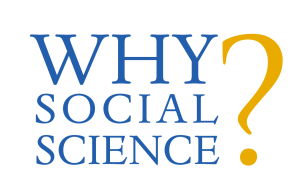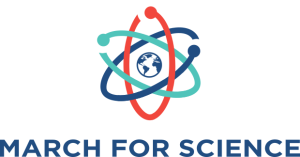Issue 08 (April 18)
COSSA Washington Update, Volume 36 Issue 8
Featured News
COSSA in Action
Federal Agency & Administration News
- NSF Seeks Nominations for Advisory Committee
- NSF Releases Dear Colleague Letter on Convergence Research
- NIH Office of AIDS Research Issues RFI on FY 2019 Trans-NIH Research Plan
Publications & Community Events
- Criminologists Call for Keeping Science at DOJ
- Academies Calls for Science Communication Partnership Proposals
- Academies Report Examines Impact of Social Competencies on College Success
- National Academies Releases New Research Integrity Report
Funding Opportunity Announcements
COSSA Member Spotlight
Why Social Science Is Marching for Science


This week’s Why Social Science? takes a break from our regular guest posts to talk about the upcoming March for Science, and how and why social and behavioral scientists can get involved. Read it here and subscribe.
COSSA is an official partner of the March for Science. We are collecting information for social and behavioral scientists participating in the March for Science, both on the COSSA March for Science website and through a weekly newsletter that compiles the latest information and updates on March for Science activity (anyone can sign up to receive it here).
286 Societies Sign Letter in Support of R&D Enterprise
On April 6, COSSA joined 285 other U.S. societies and associations in business, science, engineering, health, and higher education on a letter urging Congressional leaders to complete the fiscal year (FY) 2017 appropriations bills with “robust investments in scientific research.” The letter states the benefits of continued investment in the U.S. research and development enterprise, describes possible impacts of decreased funding, and urges policy makers to reject the cuts to science agencies proposed by the Trump Administration.
NSF Seeks Nominations for Advisory Committee
The National Science Foundation (NSF) has issued its annual call for recommendations for membership to its various advisory committees and technical boards. These committees advise NSF’s offices and directorates on program management, research direction, and policies impacting the agency. Committees of particular interest to the COSSA community include the Advisory Committee for Social, Behavioral and Economic Sciences and the Advisory Committee for Education and Human Resources. Recommendations for membership are maintained for 12 months.
NSF Releases Dear Colleague Letter on Convergence Research
The National Science Foundation (NSF) published a Dear Colleague letter on April 4 outlining new opportunities at NSF for “convergence research” projects. NSF defines convergence research as projects that have “deep integration across disciplines,” are “driven by a specific and compelling problem,” and bring together diverse teams of scientists. The Dear Colleague letter identifies the 10 Big Ideas for Future NSF Investment as prospects for convergence research topics, including Work at the Human-Technology Frontier, which is the “Big Idea” lead by the Social, Behavioral, and Economic Sciences Directorate.
NIH Office of AIDS Research Issues RFI on FY 2019 Trans-NIH Research Plan
The National Institutes of Health (NIH) Office of AIDS Research (OAR) has issued a request for information (RFI) (NOT-OD-17-053) seeking input from the scientific community on the development of the fiscal year (FY) 2019 Trans-NIH Plan for HIV-Related Research. OAR is statutorily required to develop an annual Trans-NIH Plan that serves as the framework for its trans-NIH HIV/AIDS research budget. As previously reported, in August 2015 NIH released a Notice, NIH HIV/AIDS Research Priorities and Guidelines for Determining AIDS Funding (NOT-OD-15-137), outlining its overarching HIV/AIDS research priorities along with the guidelines the agency will use to determine AIDS funding. High priority research topics include reducing the incidence of HIV/AIDS; developing the next generation of HIV therapies; identifying strategies towards a cure; improving the prevention and treatment of HIV-associated comorbidities, coinfections, and complications; and cross-cutting basic research, behavioral and social science research, health disparities, and training. Comments are due May 15, 2017.
Criminologists Call for Keeping Science at DOJ
In a statement published in the Washington Post entitled “Keep Science in the Department of Justice,” 25 former presidents of the American Society of Criminology, a COSSA governing member, argue that politics should not intrude in the science-based approach of the National Institute of Justice and the Bureau of Justice Statistics. The statement outlines recommendations to the President and Attorney General as they appoint leaders of these agencies. Priorities include maintaining standards of scientific integrity, improving existing data tools, and promoting evidence-based policies.
Academies Calls for Science Communication Partnership Proposals
As part of efforts to build on its December 2016 report, Communicating Science Effectively: A Research Agenda, the National Academies of Sciences, Engineering, and Medicine has announced that it will make two awards to support the “formation and development of partnerships of science communication researchers and practitioners and facilitate their efforts to plan collaborative projects that pursue shared research interests.” Support for the awards is provided by the Rita Allen Foundation. More information is available on the project website. Submissions are due by June 2, 2017.
Academies Report Examines Impact of Social Competencies on College Success
On April 13, the National Academies of Sciences, Engineering, and Medicine Division of Behavioral and Social Sciences and Education released a report, Supporting Students’ College Success: The Role of Assessment of Intrapersonal and Interpersonal Competencies. Supported by the National Science Foundation (NSF), the report “examines how to assess interpersonal and intrapersonal competencies (e.g., teamwork, communication skills, academic mindset, and grit) of undergraduate students for different purposes.” It also establishes “priorities for the development and use of assessments related to the identified intrapersonal and interpersonal competencies that influence higher education success, especially in STEM.” Central themes of the report include diversity and inclusion. Special attention was given to research on “student groups that have historically experienced lowered college persistence and success than other groups” including black, Hispanic, and American Indian racial/ethnic minority groups, students from low-income families, first-generation college students, and women in particular STEM disciplines. The committee concluded that additional research is needed and made 13 recommendations, including that federal agencies and foundations support “rigorous research, in partnership with higher education institutions, to understand better the three most-promising competencies and their relationship to college success.” Copies of the report are available on the Academies’ website.
National Academies Releases New Research Integrity Report
The National Academies of Sciences, Engineering, and Medicine released the Committee on Responsible Science’s report, Fostering Integrity in Research, on April 11. The report assesses the state of research integrity, including trends, challenges, and educational efforts, updating the 1992 Academies report, Responsible Science. The 1992 report proposed the current definition of research misconduct, defined as the “fabrication, falsification, or plagiarism” of research. The new report supports retaining that definition, but also calls for the recognition of detrimental research practices (DRPs). DRPs are “questionable research practices, such as the misleading use of statistics that falls short of falsification and failure to retain sufficient research data.”
The report contains 11 recommendations for improving research integrity, including the creation of an independent Research Integrity Advisory Board (RIAB). At the report’s release, Robert Nerem, the Committee’s Chair and Professor of Bioengineering and Bioscience at the Georgia Institute of Technology, said the RIAB would allow for a proactive approach to research integrity across all disciplines and stakeholders. The report also recommends that research integrity issues be viewed as part of a complex system, an area of research Nerem said is directly the purview of the social and behavioral sciences. The report calls for public and private funding for research aimed at this topic. Other recommendations include better whistleblower protections and the improvement of Responsible Conduct of Research (RCR) programs.
This article was contributed by COSSA’s spring intern, Laila Rosenthal of American University.
Funding Opportunity Announcements
- NIFA: Agriculture and Food Research Initiative (AFRI) – Foundational Program (USDA-NIFA-AFRI-006351)
- NIFA: Women and Minorities in Science, Technology, Engineering, and Mathematics Fields Program (USDA-NIFA-WAMS-006350)
- NASEM: Building Capacity for Science Communication: Partnership Awards
Society for Prevention Research Joins COSSA
 COSSA is happy to welcome the Society for Prevention Research (SPR) as a Membership Organization. SPR is an “organization dedicated to advancing scientific investigation on the etiology and prevention of social, physical and mental health, and academic problems and on the translation of that information to promote health and well-being.” COSSA’s full membership list is available here. Information on how to join can be found on the COSSA website.
COSSA is happy to welcome the Society for Prevention Research (SPR) as a Membership Organization. SPR is an “organization dedicated to advancing scientific investigation on the etiology and prevention of social, physical and mental health, and academic problems and on the translation of that information to promote health and well-being.” COSSA’s full membership list is available here. Information on how to join can be found on the COSSA website.
Back to this issue’s table of contents.
Events Calendar
- Understanding Student Debt: Moving Toward Evidence-Based Policy Solutions, April 20, 2017, Washington, DC
- Criminal Justice Reform in the Midwest: Justice Reinvestment in Nebraska, April 20, 2017, Washington, DC
- March for Science, April 22, 2017, Washington, DC
- 10th Matilda White Riley Behavioral and Social Sciences Honors, April 25, 2017, Bethesda, MD
- American Educational Research Association Annual Meeting, April 27-May 1, 2017, San Antonio, TX
- Population Association of America Annual Meeting, April 27-29, 2017, Chicago, IL
- American Association for Public Opinion Research Annual Conference, May 18-21, 2017, New Orleans, LA
- 2017 Daniel Patrick Moynihan Lecture on Social Science and Public Policy, May 18, 2017, Washington, DC
- American Evaluation Association Summer Institute: Finding Your Pathway in Evaluation, June 4-7, 2017, Atlanta, GA
- Law and Society Association Annual Meeting, June 20-23, 2017, Mexico City, Mexico
A list of COSSA members’ annual meetings and other events can be found on the COSSA events page. COSSA members who have an upcoming event they would like to see listed in the Events Calendar and on our website should send an email to jmilton@cossa.org.

